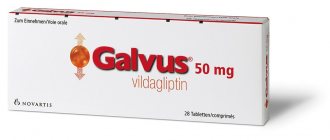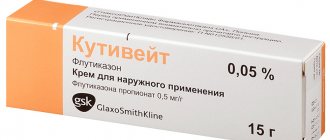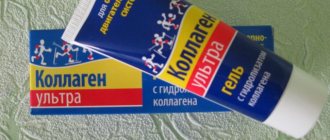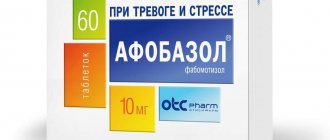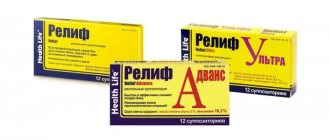2685 0
Algesir Ultra is a remedy that many doctors prescribe for pain syndromes of various origins, in particular those arising from joint diseases.
This drug helps to get rid of unpleasant sensations and greatly facilitates the course of the disease.
Algesir Ultra is a drug that is part of the NSAID group and has analgesic, anti-inflammatory and antipyretic effects. Used to relieve pain from joint pathologies and disorders associated with the musculoskeletal system.
Release form and composition
Dosage form – film-coated tablets: round, biconvex (275 mg) or oblong, biconvex, with rounded ends, scored (550 mg), blue; on the cross-section, 2 layers are visible, the inner one is white or white-yellowish in color (5, 10, 12 or 15 pieces in contour strip packs, in a cardboard pack 1, 2, 3, 5, 6 or 10 packs).
1 tablet contains:
- Active ingredient: naproxen sodium – 275 or 550 mg;
- Additional components: colloidal silicon dioxide (Aerosil), copovidone, milk sugar (lactose), macrogol 6000, microcrystalline cellulose, hypromellose (hydroxypropyl methylcellulose), talc, titanium dioxide, calcium stearate, brilliant blue dye.
Algezir Ultra
Active substance:
Naproxen*
Pharmgroup:
NSAIDs. Propionic acid derivatives
Average price in pharmacies
| Name | Manufacturer | average price |
| Algesir ultra 0.275 n10 tablet p/film/shells | OBOLENSKOYE | 124.00 |
Analogs for the active substance:Aliv Apranax Nalgesin Nalgesin forte Naprios Naprobene Naproxen Naproxen-Acree Naproxena sodium Pronaxen Sanaprox |
Indications for use
- Feverish syndrome in infectious and “cold” diseases;
- Pain syndrome of mild or moderate severity: post-traumatic pain syndrome with inflammation (sprains and bruises), postoperative pain (in maxillofacial surgery, orthopedics, traumatology, gynecology), headache, toothache, migraine, myalgia, ossalgia, lumboischialgia, neuralgia , adnexitis, algodismenorrhea;
- Diseases of the musculoskeletal system: psoriatic, rheumatoid, gouty and juvenile chronic arthritis, rheumatic soft tissue lesions, ankylosing spondylitis (ankylosing spondylitis), bursitis, tendovaginitis, osteoarthritis of peripheral joints and spine, including radicular syndrome;
- Infectious and inflammatory diseases of the ENT organs with severe pain: otitis media, tonsillitis, pharyngitis (as part of complex therapy).
Algesir Ultra tablets are used for symptomatic therapy (reducing elevated body temperature, reducing pain and inflammation) and does not affect the progression of the disease.
Contraindications
Absolute:
- Inhibition of bone marrow hematopoiesis;
- Impaired hemostasis, cerebrovascular or other bleeding;
- Severe renal failure (creatinine clearance less than 20 ml/minute);
- The period after coronary artery bypass surgery;
- Exacerbation of inflammatory bowel disease (nonspecific ulcerative colitis, Crohn's disease);
- Active gastrointestinal bleeding, erosive and ulcerative changes in the mucous membrane of the stomach or duodenum;
- Anamnestic data on an attack of bronchial obstruction, rhinitis, urticaria after taking any NSAID, including acetylsalicylic acid;
- Children and adolescence up to 15 years;
- Pregnancy and lactation;
- Hypersensitivity to the components of the drug.
Relative (Algesir Ultra is taken with caution):
- Creatinine clearance from 20 to 60 ml/minute;
- Diabetes;
- Dyslipidemia/hyperlipidemia;
- Cerebrovascular diseases;
- Cardiac ischemia;
- Severe somatic diseases;
- Peripheral arterial diseases;
- Chronic heart failure;
- Smoking;
- Frequent drinking of alcohol;
- Presence of Helicobacter pylori infection;
- History of ulcerative lesions of the gastrointestinal tract;
- Elderly age;
- Long-term treatment with NSAIDs;
- Concomitant use of selective serotonin reuptake inhibitors (including citalopram, paroxetine, fluoxetine, sertraline), anticoagulants (for example, warfarin), oral glucocorticosteroids (for example, prednisolone), antiplatelet agents (including clopidogrel, acetylsalicylic acid).
A voice from the people
Reviews from people who have already tried Algesir Ultra in practice.
About two years ago my grandfather developed ankylosing spondylitis. He could not walk normally, bending or crouching was difficult for him.
After the examination, the doctor prescribed him treatment and prescribed him to take the drug Algesir Ultra to reduce pain. According to my grandfather, the pain disappeared almost immediately after taking it. Taking this painkiller made his life much easier and speeded up his treatment.
Mikhail, 35 years old
When I developed acute osteochondrosis, I didn’t know what to do with myself, the pain was just hellish. I practically could not walk; with the slightest movement, pain arose throughout my body. I had to call an ambulance; after examining me, the emergency doctor prescribed me the painkiller Algesir Ultra and advised me to go to the clinic for further examination.
After taking this drug, I felt much better, the pain went away, and I was able to get to the clinic normally for further examination and treatment.
Evgeniya, 49 years old
Directions for use and dosage
Algesir Ultra should be taken orally with food: swallow the tablets whole and drink enough liquid.
Recommended doses:
- Pain syndrome: 550-1100 mg, for diseases accompanied by very severe pain, but in the absence of anamnestic data on diseases of the gastrointestinal tract, it is possible to increase the daily dose to 1650 mg, but the duration of such treatment should not exceed 2 weeks;
- Increased body temperature: first dose – 550 mg, then every 6-8 hours – 275 mg;
- Migraine: for pain – 550 mg 2 times a day; if within 4-6 weeks the intensity, duration and frequency of migraine attacks do not decrease, the drug should be discontinued; at the first signs of a migraine attack, it is recommended to take 825 mg, if necessary after 30 minutes - another 275-550 mg;
- Gynecological pain (algodysmenorrhea, adnexitis, pain after insertion of an intrauterine device, etc.): initial dose – 550 mg, then every 6-8 hours – 275 mg;
- Acute attack of gout: initial dose – 825 mg, after 8 hours – 550 mg, then every 8 hours – 275 mg until the attack stops;
- Rheumatic diseases: 550-1100 mg 2 times a day (morning and evening) depending on the clinical situation.
The usual daily dose is 550-1100 mg in 2 divided doses.
For patients in whom pain is the main symptom, patients transferred to Algesir Ultra from high doses of another NSAID, as well as for severe night pain and/or morning stiffness, the recommended initial daily dose is 825-1650 mg.
Pharmacological properties
The principle of action of the active component of the drug, naproxen, is based on inhibition of the COX enzyme, which as a result suppresses the synthesis of prostaglandins included in arachidonic acid. In addition, it has an inhibitory effect on the state of platelet aggregation.
Reduces the intensity of pain, namely pain in the joints at rest and during movement, relieves stiffness in the morning, swelling and swelling of the joints, and provides increased range of motor functions. Anti-inflammatory effects are observed at the end of the first 7 days of treatment.
Side effects
- From the digestive system: ulcerative stomatitis, diarrhea/constipation, melena, epigastric discomfort, nausea, abdominal pain, vomiting, vomiting with blood, bleeding and perforation of the gastrointestinal tract, impaired liver function, increased activity of liver enzymes, gastropathy associated with taking NSAIDs (damage to the antrum of the stomach in the form of ulcers, erosions, hemorrhages, erythema of the mucous membrane), jaundice, hepatitis;
- From the cardiovascular system: shortness of breath, edema, palpitations, vasculitis, congestive heart failure;
- From the genitourinary system: nephrotic syndrome, hematuria, renal papillary necrosis, renal failure, interstitial nephritis, glomerulonephritis, menstrual irregularities;
- From the central nervous system: difficulty concentrating, sleep disturbance, drowsiness, headache, dizziness, insomnia, muscle weakness, slow reaction speed, myalgia, aseptic meningitis, malaise, cognitive dysfunction, depression;
- From the hematopoietic organs: hemolytic anemia, thrombocytopenia, leukopenia, aplastic anemia, granulocytopenia, eosinophilia;
- From the respiratory system: eosinophilic pneumonia;
- From the senses: visual impairment, hearing loss, tinnitus;
- From the skin: ecchymosis, itching, increased sweating, photodermatoses, alopecia, thrombocytopenic purpura;
- Allergic reactions: urticaria, skin rash, Stevens-Johnson syndrome, erythema multiforme exudative, epidermal toxic necrolysis (Lyell's syndrome), angioedema;
- Other reactions: hypoglycemia, hyperglycemia, hyperthermia, thirst.
special instructions
To avoid the development of undesirable reactions from the gastrointestinal tract, it is recommended to take Algesir Ultra in the minimum effective dose in the shortest possible short course.
If fever and/or pain persists or worsens, you should consult a doctor.
In patients with renal impairment, creatinine clearance should be monitored during treatment with naproxen. If this level is below 20 ml/minute, taking the drug is not recommended.
Patients with hypersensitivity to other analgesics, bleeding disorders and bronchial asthma should consult a doctor before using Algesir Ultra.
Patients receiving anticoagulant therapy should be aware that naproxen may prolong bleeding time.
The concentration of unbound naproxen increases in liver cirrhosis (including chronic alcoholic cirrhosis), so lower doses are recommended in such patients. A dose reduction is also necessary for older people.
Without a doctor's prescription, Algesir Ultra should not be taken simultaneously with other analgesic and anti-inflammatory drugs.
The drug is discontinued 48 hours before surgery, analysis to determine 17-ketosteroids and the concentration of 5-hydroxyindolylacetic acid in the urine.
Patients on a salt-restricted diet should be aware that each tablet contains approximately 25 mg of sodium.
From the practice of doctors
We asked doctors for their opinion about this not so popular drug and this is what they answered.
I have repeatedly prescribed the drug Algesir Ultra to my patients to eliminate pain due to joint diseases. The drug helps almost instantly; many of my patients note that 10 minutes after taking the pill, the pain completely subsides.
In principle, the drug is good for reducing pain, but it still has many side effects and contraindications. I strongly recommend that after you experience pain, go straight to the doctor, and only then take the drug that the doctor will prescribe. Do not self-medicate under any circumstances!
Rheumatologist
Often, with severe pain during joint diseases - arthritis, osteochondrosis, gout, ankylosing spondylitis, spondylitis, you have to take painkillers. Quite often I prescribe Algesir Ultra to my patients.
This remedy has a quick effect, the pain goes away within 10-15 minutes after taking the remedy. But as for side effects, they occur very rarely and are not too pronounced.
Orthopedist
Drug interactions
Algesir Ultra is not taken simultaneously with other NSAIDs, as the risk of side effects increases.
Magnesium- and aluminum-containing antacids reduce the absorption of naproxen, probenecid increases its concentration in the blood plasma.
When combined with cyclosporine, the risk of developing renal failure increases.
With the simultaneous use of drugs that are significantly bound to plasma proteins (for example, anticoagulants, diphenin, phenytoin), their effect may be enhanced or an overdose may occur.
Naproxen may inhibit the natriuretic effect of furosemide, reduce the hypotensive effect of beta-blockers (including propranolol), and also increase the risk of renal failure due to the use of angiotensin-converting enzyme inhibitors.
Naproxen increases the concentration of lithium in plasma and also slows down the excretion of sulfonamides, phenytoin and methotrexate, which increases the likelihood of developing their toxic effects.
Myelotoxic drugs increase the manifestations of hematotoxicity of Algesira Ultra.
Analogs
Indirect analogues are any drugs from the NSAID group: diclofenac, meloxicam, indomethacin. When taking them, the same contraindications are possible. Direct analogues of Algesir are the following drugs:
- "Apranax";
- "Pronaxen";
- "Sanaprox";
- "Naprosin."
Attention! When continuing treatment, it is worth using the same trade name with which it began.
They differ in price and manufacturer. Medicines have different representation in the pharmacy chain and different release forms. The effects are characteristic of naproxen.
Effects of NSAIDs on the stomach
